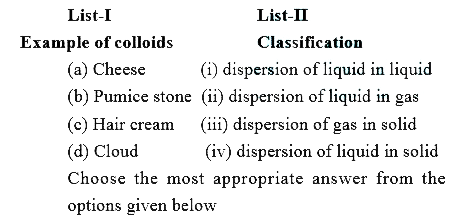Given below are two statements :
Statement I : Upon heating a borax bead dipped in cupric sulphate in a luminous flame, the colour of the bead becomes green.
Statement II : The green colour observed is due to the formation of copper(I) metaborate In the light of the above statements, choose the most appropriate answer from the options given below :
Both Statement I and Statement II are false
Both Statement I and Statement II are true
Statement I is false but Statement II is true
Statement I is true but Statement II is false
The correct Answer is:A
To solve the question, we need to analyze both statements regarding the behavior of a borax bead dipped in cupric sulfate when heated in a luminous flame.
Step 1: Analyze Statement I
Statement I: Upon heating a borax bead dipped in cupric sulfate in a luminous flame, the color of the bead becomes green.
- When a borax bead is heated in a luminous flame, it is expected to undergo a reaction with the cupric sulfate present.
- The cupric sulfate (CuSO₄) is blue in color, and when heated, it can form a different compound.
- In this case, the expected color change is not to green but rather to colorless or a different hue depending on the oxidation state of copper.
- Therefore, Statement I is false.
Step 2: Analyze Statement II
Statement II: The green color observed is due to the formation of copper(I) metaborate.
- The formation of copper(I) metaborate (CuBO₂) would typically result in a color change.
- However, the correct observation is that the bead does not turn green; instead, it may turn colorless or red due to the reduction of cupric ions to cuprous ions or metallic copper.
- Since the formation of copper(I) metaborate does not lead to a green color, Statement II is also false.
Conclusion
Based on the analysis of both statements:
- Both Statement I and Statement II are false.
Final Answer
The correct answer is: Both statements are false.
---
Statement I: Upon heating a borax bead dipped in cupric sulfate in a luminous flame, the color of the bead becomes green.
- The cupric sulfate (CuSO₄) is blue in color, and when heated, it can form a different compound.
- In this case, the expected color change is not to green but rather to colorless or a different hue depending on the oxidation state of copper.
- Therefore, Statement I is false.
Statement II: The green color observed is due to the formation of copper(I) metaborate.
- However, the correct observation is that the bead does not turn green; instead, it may turn colorless or red due to the reduction of cupric ions to cuprous ions or metallic copper.
- Since the formation of copper(I) metaborate does not lead to a green color, Statement II is also false.
Based on the analysis of both statements:
- Both Statement I and Statement II are false.
The correct answer is: Both statements are false.
Topper's Solved these Questions
Similar Questions
Knowledge Check
Match List - I with List- II
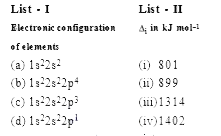
Choose the most appropriate answer from the options given below -A(a)→(ii),(b)→(iii),(c)→(iv),(d)→(i)B(a)→(i),(b)→(iv),(c)→(iii),(d)→(ii)C(a)→(i),(b)→(iii),(c)→(iv),(d)→(ii)D(a)→(iv),(b)→(i),(c)→(ii),(d)→(iii)Match List - I with List- II
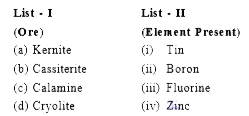
Choose the most appropriate answer from the options given below -A(a)→(i),(b)→(iii),(c)→(iv),(d)→(ii)B(a)→(ii),(b)→(i),(c)→(iv),(d)→(iii)C(a)→(ii),(b)→(iv),(c)→(i),(d)→(iii)D(a)→(iii),(b)→(i),(c)→(ii),(d)→(iv)
Match List-I with List -II
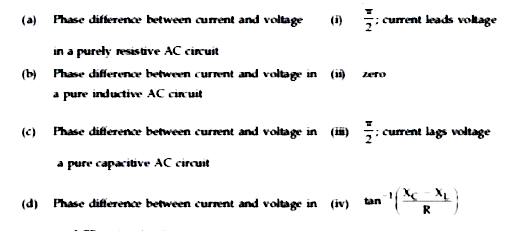
Choose the most appropriate answer from the options given below:
View SolutionMatch List-I with List-II :
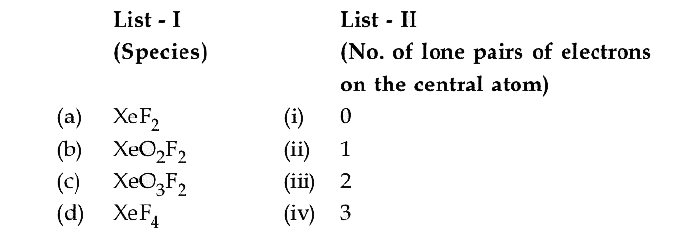
Choose the most appropriate answer from the options given below :
View SolutionMatch List-I with List-II :
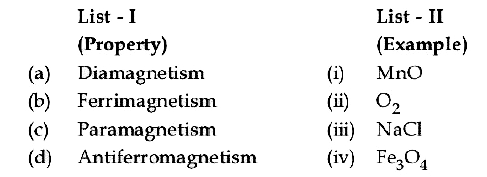
Choose the most appropriate answer from the options given below :
View SolutionMatch List -I with List -II :

Choose the most appropriate answer from the options given below :
View SolutionMatch List - I with List - II
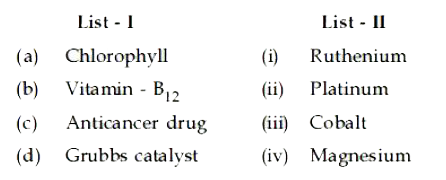
Choose the most appropriate answer from the options given below :
View SolutionMatch list - I with List - II :

Choose the most appropriate answer from the options given below :
View Solution


